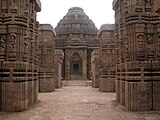Hinduism in Odisha
 Lingaraja Temple built by the Somavanshi king Jajati Keshari. | |
| Total population | |
|---|---|
| 39,300,341 (2011)[1] 93.63% | |
| Religions | |
| Sanatan (Hinduism) | |
| Scriptures | |
| Bhagavad Gita and Vedas (other scripture and literature includes Gita Govinda, Ramayana, and others) | |
| Languages | |
| Odia | |
| Related ethnic groups | |
| Odia Christians and Odia Muslims |
Hinduism is a majority religion in Odisha, which is followed by nearly 93.6% of the total population of the state.[2] Odisha has a very rich cultural heritage of Hinduism and the state has second highest percentage of Hindus, after Himachal Pradesh.[3] The state is home for the tribal culture and historical Hindu temple, the notable includes the Jagannath Temple in Puri and Lingaraja Temple.[4] Ratha Yatra of Puri is one of the biggest Hindu pilgrimage in India.[5] The state has also many Historical sites.[6]
Demographics
[edit]Majority of population of Odisha follows Hinduism, which is about 93.6% of the total population. Many of the tribal people follows their traditional tribal religions.
Hindus decadal population
[edit]| Year | Pop. | ±% |
|---|---|---|
| 1951 | 14,368,411 | — |
| 1961 | 17,123,193 | +19.2% |
| 1971 | 21,121,056 | +23.3% |
| 1981 | 25,161,725 | +19.1% |
| 1991 | 29,971,257 | +19.1% |
| 2001 | 34,726,129 | +15.9% |
| 2011 | 39,300,341 | +13.2% |
| Source: [7] | ||
Hindu population by district
[edit]| Districts of Odisha | Total pop | Hindus pop | Hindus % |
|---|---|---|---|
| Bargarh | 1,346,336 | 1,327,967 | 98.64% |
| Jharsugu | 509,716 | 490,127 | 96.16% |
| Sambalpur | 935,613 | 873,795 | 93.39% |
| Debagarh | 274,108 | 261,544 | 95.42% |
| Sundargarh | 1,830,673 | 1,431,762 | 78.21% |
| Kendujhar | 1,561,990 | 1,525,874 | 97.69% |
| Mayurbhanj | 2,223,456 | 1,859,639 | 83.64% |
| Baleshwar | 2,024,508 | 1,937,765 | 95.72% |
| Bhadrak | 1,333,749 | 1,248,486 | 93.61% |
| Kendrapara | 1,302,005 | 1,257,156 | 96.56% |
| Jagatsinghapur | 1,057,629 | 1,014,872 | 95.96% |
| Cuttack | 2,341,094 | 2,199,526 | 93.95% |
| Jajapur | 1,624,341 | 1,543,317 | 95.01% |
| Dhenkanal | 1,066,878 | 1,060,943 | 99.44% |
| Anugul | 1,140,003 | 1,127,926 | 98.94% |
| Nayagarh | 864,516 | 859,219 | 99.39% |
| Khordha | 1,877,395 | 1,798,214 | 95.78% |
| Puri | 1,502,682 | 1,459,872 | 97.15% |
| Ganjam | 3,160,635 | 3,132,628 | 99.11% |
| Gajapati | 518,837 | 341,308 | 65.78% |
| Kandhamal | 648,201 | 527,757 | 81.42% |
| Baudh | 373,372 | 372,070 | 99.65% |
| Sonapur | 541,835 | 538,472 | 99.38% |
| Balangir | 1,337,194 | 1,312,924 | 98.19% |
| Nuapada | 530,690 | 523,309 | 98.61% |
| Kalahandi | 1,335,494 | 1,322,363 | 99.02% |
| Rayagada | 831,109 | 770,572 | 92.72% |
| Nabarangapur | 1,025,766 | 991,639 | 96.67% |
| Koraput | 1,180,637 | 1,119,527 | 94.82% |
| Malkangiri | 504,198 | 495,556 | 98.29% |
| Sources:[8] | |||
Temples
[edit]-
Muktesvara deula Panoramic View, Odisha.
-
Jagannath Temple, Puri Panoramic View, Odisha.
Temple architecture in Odisha architecture has assumed a unique identity and evolved into the rock-cutting and wooden carved style which is also a very common style of Hindu temples in Andhra Pradesh and Telangana. In the older times in Odisha's history, the rulers used temples as symbol of respect to gods and their prosperity and hence gave special focus for the best style of Hindu temple architecture.
References
[edit]- ^ "Population by religion community – 2011". Census of India, 2011. The Registrar General & Census Commissioner, India. Archived from the original on 25 August 2015.
- ^ "Census of India Website : Office of the Registrar General & Census Commissioner, India". Government of India. 2011 Census of India. Archived from the original on 13 September 2015. Retrieved 11 May 2021.
- ^ "India's religions by numbers". The Hindu. 26 August 2015. ISSN 0971-751X. Retrieved 11 May 2021.
- ^ "Tribal influence on Hindu religion prominent in Odisha: Historian". The New Indian Express. Retrieved 11 May 2021.
- ^ "Rath Yatra 2020 Date: Jagannath Rath Yatra in Puri: Check History and significancea". The Times of India. 22 June 2020. Retrieved 11 May 2021.
- ^ Chatterjee, Suhas (1998). Indian Civilization and Culture. M.D. Publications Pvt. Ltd. pp. 68. ISBN 978-81-7533-083-2.
- ^ "Findings on Religious Affiliations of Population of Odisha" (PDF). Magazine Orissa. pp. 18–24.
- ^ "Census 2011: Hindus dip to below 80 per cent of population; Muslim share up, slows down". The Indian Express. 27 August 2015. Retrieved 11 May 2021.





